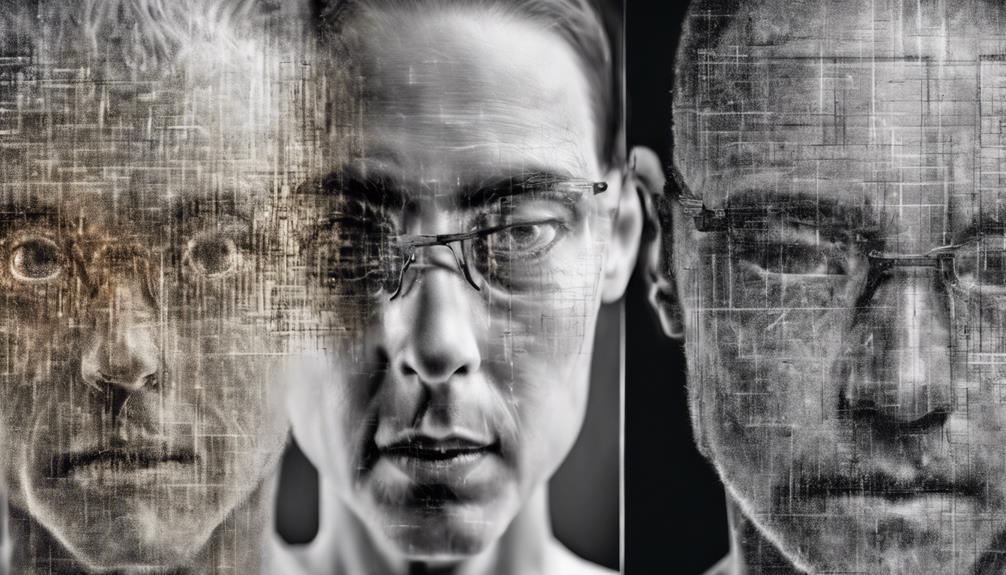Have you ever considered the potential impact of diabetes on your vision, beyond the typical worries?
Double vision in diabetes poses a unique challenge that requires a deeper understanding. Exploring the intricacies of this vision complication sheds light on the importance of proactive management.
Understanding the root causes, symptoms, and treatment options for double vision in diabetes can significantly impact your quality of life.
Let's uncover the complexities of double vision in the context of diabetes and how it ties into overall health management.
Key Takeaways
- High blood sugar linked to diabetic retinopathy and double vision.
- Urgent consultation with eye specialist for prompt diagnosis.
- Treatment involves lenses, blood sugar control, and ophthalmic interventions.
- Nerve palsies can impact daily activities, managed with specialized lenses and blood glucose control.
Understanding Double Vision in Diabetes
Exploring the intricate link between diabetes and double vision reveals the complex mechanisms underlying this ocular complication.
In diabetes, double vision can stem from nerve palsies affecting the third and sixth cranial nerves, commonly seen in diabetic patients. These nerve palsies, particularly involving the third cranial nerve, may spontaneously resolve over several months.
To address symptoms of double vision in diabetic individuals, specialized lenses can be employed. These lenses aid in stabilizing vision and alleviating the discomfort associated with diabetes-related double vision.
However, it's essential to recognize that maintaining stable blood glucose levels is paramount in managing and stabilizing vision in cases of diabetes-related double vision. By controlling blood sugar levels effectively, diabetic individuals can optimize their vision outcomes and reduce the frequency and severity of double vision episodes, enhancing their overall quality of life.
Causes of Double Vision in Diabetes

In diabetes, double vision can arise from various causes related to nerve damage, eye muscle dysfunction, and brain signal processing, all contributing to the complexity of this ocular complication.
- High blood sugar levels: Elevated glucose levels can lead to diabetic retinopathy, affecting blood vessels in the eyes and potentially causing double vision.
- Diabetic Retinopathy: Damage to the blood vessels in the retina can result in visual disturbances, including double vision.
- Eye Muscle Paralysis: Diabetes-induced damage can lead to paralysis of the eye muscles, causing misalignment and double vision.
- Diplopia: Conflicting signals from paralyzed eye muscles reaching the brain can result in diplopia or double vision.
To determine the specific cause of double vision in diabetic individuals, it's crucial to undergo a comprehensive eye exam early on and possibly require lab tests to confirm the underlying issue. It's essential to rule out more severe conditions like tumors or aneurysms that could also manifest as double vision in diabetes.
Symptoms of Double Vision Diabetes
Symptoms of double vision in diabetes manifest in a range of presentations, including monocular and binocular diplopia. High blood sugar levels in diabetes can lead to complications such as diabetic retinopathy, causing vision loss and potentially double vision. Individuals experiencing double vision might also report accompanying symptoms like eye pain, muscle weakness, or a bulging eye. It's essential to consider nerve palsies as a potential cause, especially if double vision improves when one eye is closed.
When faced with these symptoms, seeking immediate consultation with an eye specialist is crucial for a proper diagnosis and management plan. The specialist can conduct a thorough examination to determine the underlying cause of double vision, which may vary depending on the specific cranial nerves affected in diabetes-related complications. By addressing the symptoms promptly and obtaining a comprehensive evaluation from an eye specialist, individuals with diabetes can receive the appropriate care and support needed to manage double vision effectively.
Treating Double Vision in Diabetes

To address double vision in diabetes, treatment options often involve the use of special lenses or prisms for managing visual disturbances in diabetic patients. Proper control of blood sugar levels is crucial to stabilize vision and manage diabetic-induced double vision effectively. Timely intervention and regular monitoring play key roles in resolving diabetic double vision, with some cases of diabetic third-nerve palsies causing double vision resolving spontaneously over time.
- Special Lenses and Prisms: These optical aids can help correct double vision and improve visual clarity in diabetic individuals.
- Blood Sugar Control: Maintaining stable blood sugar levels is essential for managing diabetic-induced double vision and preventing further complications.
- Timely Intervention and Monitoring: Prompt assessment and continuous monitoring of eye health are crucial for addressing diabetic double vision effectively.
- Ophthalmic Interventions: Targeted treatments and therapies offered by eye care professionals can alleviate symptoms and improve the quality of vision in diabetic patients.
Managing Double Vision Diabetes
When managing double vision in diabetes, understanding the involvement of specific cranial nerves is crucial for effective treatment strategies. Double vision, often caused by nerve palsies affecting the third and sixth cranial nerves in diabetic patients, can lead to challenges in daily activities.
While some third-nerve palsies may resolve spontaneously over time, specialized lenses can assist in managing persistent double vision symptoms. To optimize vision stability, diabetic patients must prioritize maintaining optimal blood glucose levels. Fluctuations in blood sugar levels can exacerbate double vision symptoms, making it essential to monitor and control these levels diligently.
Additionally, addressing double vision in diabetes may require interventions such as patching one eye to alleviate symptoms temporarily. By implementing comprehensive management strategies that focus on stabilizing blood glucose levels and utilizing appropriate visual aids, healthcare professionals can significantly improve the quality of life for individuals experiencing double vision due to diabetes.
Frequently Asked Questions
How Can You Tell if Diabetes Is Affecting Your Eyes?
If diabetes is affecting your eyes, symptoms may include blurred vision, difficulty seeing at night, and changes in color perception. Regular eye exams are crucial to detect any diabetic eye complications early.
Maintaining stable blood sugar levels through diet, exercise, and medication is key in preventing eye issues. Consulting with healthcare professionals for proper guidance and treatment is essential to preserve eye health in diabetic individuals.
What Are 2 Symptom of Early Stage Diabetic Retinopathy?
When looking for signs of early stage diabetic retinopathy, we can observe:
- Mild blurriness in vision
- Occasional floaters in the eyes
These subtle indicators may signal the onset of this condition. Regular eye check-ups are crucial to catch these symptoms early on.
Is Double Vision a Symptom of Low Blood Sugar?
Yes, double vision can indeed be a symptom of low blood sugar. When blood sugar levels drop too low, it impairs the brain's ability to coordinate eye movements, resulting in double vision. This condition is known as hypoglycemia-induced diplopia.
Consuming sugar or glucose promptly can help alleviate these symptoms. Monitoring blood sugar levels regularly is crucial to managing and preventing episodes of double vision related to low blood sugar in diabetes.
What Causes Sudden Onset Double Vision?
Sudden onset double vision can stem from various causes, like nerve damage or circulation issues. Immediate consultation with an eye specialist is crucial for an accurate diagnosis.
Managing blood sugar levels plays a vital role in stabilizing vision. Proper care and monitoring are essential for diabetic patients experiencing sudden double vision.
Conclusion
In conclusion, managing diabetes is essential in preventing eye muscle paralysis and double vision. Are we prioritizing our blood sugar control and medication adherence to avoid vision complications?
Proper care and attention to our health can make all the difference in maintaining our vision and overall well-being. Let's stay vigilant and proactive in managing our diabetes to protect our eyesight.










